- Home
- Chuck Palahniuk
Beautiful You Page 4
Beautiful You Read online
Page 4
Without breaking eye contact, the man crossed to the bottom of the stairs and began to climb toward her. Still two steps down, he stopped and offered his hand. As she had once been below him on the office carpet, reaching up, now he was beneath her.
She reached out. His fingers felt as cold as she remembered.
Just as she’d seen in the National Enquirer, C. Linus Maxwell escorted her. Just as he’d escorted so many exquisite women. Down the remaining steps. Across the hushed room. He pulled out her chair and seated her. He took his own seat and closed his notebook. Only then did the voices that surrounded them begin to rise.
“Thank you for joining me,” he said. “You look lovely.”
And for once Penny actually believed she might.
In the next instant, his hand lashed out. As if to slap her face, he leaned forward, swinging his arm so fast it blurred. She winced.
When she opened her eyes, his fist filled her vision, huge, hanging there, his knuckles so close they almost touched the tip of her nose.
“I’m sorry if I scared you,” he said, “but I think I caught him.” Opening his fingers, Corny Maxwell showed her the crushed little corpse of a black housefly.
The next morning, Penny was standing outside the locked doors of Bonwit Teller for a half hour before they opened. She couldn’t afford even a day’s credit card interest on what the evening gown had cost. Even if this made her late for work, she had to return the dress right away.
The fairy tales never showed Cinderella getting up at dawn to return her gown and her shoes, terrified that some wary sales-clerk would notice a flaw and refuse to credit her account with a full refund.
Despite the extraordinary food and wine, dinner had been less than magical. The stares had never let up. It was impossible to relax and have fun in a fishbowl. Maxwell wasn’t the problem. He’d been attentive, almost too attentive, hanging on her every word. Several times, he’d even opened his notebook and written a few words in a quick, spidery shorthand, as if he were taking dictation. It felt less like a romantic tryst than a pleasant job interview. He’d volunteered almost no information about himself, nothing she didn’t already know from gossip columns. In her nervousness, Penny had chattered without taking a breath. Desperate to fill any possible silence, she’d told him about her parents, Myrtle and Arthur, and their suburban life. She’d reminisced about the long hours in law school. She’d rambled on about the love of her life, her Scotch terrier, Dimples, and how he’d died the year previous.
Throughout her monologue, Maxwell had smiled calmly. Thank goodness the waiters had occasionally arrived, giving her a moment to shut up and catch her breath.
“If madam will allow…,” a waiter said with a white-gloved flourish of his hand, “the kobashira sushi is a house specialty.”
Penny smiled winningly. “That sounds delish.”
Max shot her a questioning look. “You do know that’s raw aoyagi scallops, don’t you?”
She didn’t. In fact, Maxwell might well have just saved her life. Unknown to him she had a severe shellfish allergy. One succulent bite and she would’ve slumped to the floor, swollen and lifeless. Penny’s alarm must’ve shown on her face, because he’d immediately revised her order, saying, “The lady will have the Chicken Divan.”
Thank God that someone was paying attention. Her runaway mouth resumed its nervous monologue.
She knew she sounded pathetic. Still, Penny couldn’t stop herself. No one here had ever expressed any interest in her, not in New York City. She’d gone from being her parents’ little miracle to being miserable and invisible. Most nights she’d force herself to walk around the streets until the neighborhood fell quiet and she felt exhausted enough to go to bed. She’d wander around the Upper East Side, alone except for the doormen who stood behind glass in the elegant lobby of each building and watched her pass. These stately town houses and sumptuous co-op apartments, these were what everyone aspired to. In some way she was trying to train herself to want them also. The truth was: She didn’t. Penny only pretended to want the jewelry in the windows at Cartier and the furs at Bloomingdale’s.
She didn’t want merely the trappings of success. Penny craved actual power. Even to her own ears she sounded crazy ambitious.
Above all, Penny didn’t want what other women professed to want. They seemed possessed, the way they swarmed to the same mundane things. And that worried her; she felt shut out of some hive. If she didn’t crave the correct movie heartthrobs and scented candles, she worried that something was horribly wrong with her.
Daily, she caught sight of lady attorneys and execs furiously crunching numbers and barking demands into phones. None seemed to possess some progressive enlightenment. Theirs no longer seemed like the road less taken. Penny sought a career path beyond the knee-jerk strictures of gender identity politics.
Over the dessert course, Penny Harrigan admitted that she didn’t know what she wanted.
Becoming a lawyer wasn’t her life’s dream. As a teenager in high school she’d been told by everyone—her parents, her teachers, her minister—that a person needed a long-term goal and a plan for achieving it. Everyone said she needed to devote her life to something. She’d chosen a career in law as blithely as if she’d plucked the vocation, unseen, from a hat. President Hind notwithstanding, being an attorney was no more appealing to Penny than wearing a sable coat and walking two afghan hounds in diamond collars to hear Verdi at the Met. No, to be honest Penny said she didn’t know what she wanted, but she knew something … soon, some glorious destiny would reveal itself to her.
Maxwell hadn’t asked about any of this, but he listened intently. He watched as if he were memorizing her. At one point, between the appetizers and the salad, he took out the small notebook in which he’d been jotting notes when she arrived. He opened it to a blank page. He removed the cap from a silver fountain pen and began to write, seemingly transcribing her fears. Penny couldn’t tell for certain, because his handwriting was cramped, almost microscopic. Scribbling continuously, he was either remarkably rude, or Maxwell was enormously empathetic and caring.
Having her words recorded made her feel self-conscious, but it couldn’t silence the overflow of her pent-up anxiety. She’d never expressed this to anyone, but her life seemed to have stalled. After twenty-five years of getting good grades and behaving politely, she’d reached a terrifying dead end. The full extent of her potential. Even as she talked Penny was aware that she’d most likely never see this man again. That made him a safe confessor.
Her relief was evident. Under his rapt gaze Penny glowed. She preened. Emboldened by his attention, she shook her head to make the piñata-shaped earrings dance. She lifted one hand to her bosom, trailing her fingertips over the sinuous curves of the jade dragon. Both accessories reminded her how blessed she was with girlfriends.
Max’s blue eyes seemed fascinated by her every gesture. He smiled but didn’t interrupt. His eyes never left hers, but his hand continued to write.
He almost looked in love. This was more than infatuation. More than love at first sight. Maxwell seemed enchanted by the sound of her voice. With his entire body, he seemed to lean forward with yearning. Something in his expression said that he’d been searching for her his entire life.
Penny wanted this kind of attention from the world. She wanted people everywhere to know her name and to love her. There, she’d admitted it aloud. But she couldn’t do anything that would justify such massive public acclaim. She just needed a mentor, a teacher, someone to discover her.
Standing outside the locked department store doors, Penny held the garment bag high, lest it drag on the sidewalk. She recalled each delicious course of the meal she hadn’t enjoyed. She’d been too afraid of dropping food into her lap. One itty-bitty stain, and she’d spend the next five years paying for her own sloppiness. When the store’s doorman turned the locks she rushed straight to the department where she’d bought the gown.
Waiting at the register was the sales
lady who’d helped her less than twenty-four hours before.
Offering the garment bag, her voice as firm as she could make it, Penny said, “I’d like to return this.”
The saleslady took the bag by the hanger. Laying it on the counter, she unzipped it and inspected the red satin folds.
“When I got home I tried it on,” Penny said. With one hand she made what she hoped was a dismissive gesture. “It isn’t at all what I had in mind.”
The saleslady tossed and smoothed the skirt, peering at the seams, the hem. She asked, “So you didn’t actually wear it?”
“No,” Penny replied. She held her breath, terrified that a snagged stitch or perspiration stain would expose her as a liar.
The unsmiling woman pressed, “Not even for a quick dinner?”
Penny was certain the woman had found a wine stain. A smudge of chocolate mousse. Or she’d smelled perfume or cigarette smoke in the fabric. It might’ve been Penny’s imagination, but suddenly the sales floor seemed crowded with shoppers, sales associates, even a security guard, all of them eavesdropping on her interaction. “No,” Penny insisted. Now she was sweating.
“Not at Chez Romaine?”
“No,” Penny squeaked.
The saleslady fixed her with a stern look and said, “I need to show you something.” Tucking the dress back inside its garment bag, she reached below the counter and brought out something. It was a newspaper: today’s New York Post. There on the front page was the headline: “Nerd Prince Plucks New Cinderella from Obscurity.”
And next to those huge words was a color picture of Penny sitting elbow-to-elbow with Maxwell. There was no denying it: She was wearing the dress.
“If you don’t mind me saying so, miss,” the saleslady said, her expression damning, “this is unacceptable!”
Penny was so, so busted. In her head she did a quick calculation. Based on the price and her current credit card interest rate, she’d have the dress paid for sometime around her fortieth birthday.
“For this kind of publicity,” the woman admonished, “the people at Dolce and Gabbana ought to be paying you to wear their clothes.” Leaning forward like a conspirator, she said, “Prada. Fendi. Hermès. They’d die for this much ink.” She winked. “Let me contact a few people on your behalf. If you’re going to be accompanying Mr. Maxwell, you could earn a fortune by promoting certain designers.”
That might be a problem. Maxwell had asked whether he could call her, but in Penny’s experience that was strictly a courtesy. It never guaranteed a second date. They hadn’t made definite plans. She didn’t say it now, but she might never see him again.
Looking around the dress department, Penny saw that strangers were gravitating toward them. Men. Women. Some wearing uniforms. Some in fur coats. Everyone was clutching the same morning edition of the Post. And they were all beaming at her.
This saleslady who’d been so unfriendly only the day before, now her face broke into a shy smile. Her eyes sparkling and alive, she sighed. Placing one hand flat against her chest as if to calm a rapidly beating heart, she said, “Please forgive my unprofessional behavior, but …”
Even under the woman’s heavy makeup, Penny could see that she was blushing.
Offering the day’s Post, she asked, “Would you autograph your picture for my daughter?”
C. Linus Maxwell didn’t call. Not the next day. Nor the day after. A week went by.
Penny went to work and shrugged off Monique’s excited interrogation about Chez Romaine.
After work, Penny went to the Jackson Heights branch of Chase Manhattan and rented a safe-deposit box. It required two keys to open. She watched as the bank clerk inserted his key and turned it. She used her own key, and he left her to open the metal box in the privacy of a small room. Once he’d taken leave, Penny picked something small and pink from her handbag and placed it in the box. Quickly, she locked it and summoned the clerk. Her share-and-share-alike roommates wouldn’t get another chance to borrow her diaphragm.
Back at the apartment, she returned the earrings and necklace. Every time her phone chimed with a call or text, she caught Kwan Qxi and Esperanza watching her expectantly. But every time the message was from her mom or dad. Or it was the sales associate at Bonwit Teller announcing that she’d scored some dazzling Alexander McQueen gown or pair of Stella McCartney heels for Penny’s next night as Cinderella.
In the checkout line at the grocery store, she stood waiting to buy her ice cream, trying to ignore the tabloid headlines that glared out at her. “Cinderella Gets the Brush-Off!” Another front page showed a huge picture of her buying ice cream, under the headline, “Rejected Cinderella Stuffing Herself!” It was surreal. Here she was buying butter brickle ice cream while she looked at a photo of herself, taken the day before, buying ice cream. To make matters worse, in the more recent photos she already looked fatter! Everyone in the store recognized her and stood ready to pat her on the shoulder and console her. The cashier waved her through without paying, telling her, “No charge, honey.” To be an object of pity in New York—the city without pity—that’s how far she had fallen.
A few days later she could barely get her pants to button. Too much free comfort food. That’s why she was taken aback when Tad asked her to lunch at the Russian Tea Room. There, seated at an intimate corner booth in that swank setting, he made her laugh with his rollicking stories about Yale panty raids. Tad recited his curriculum vitae in its entirety, obviously insecure about how he’d compare with her recent billionaire beau. He boasted about rowing as captain for the Yale team. As proof, he wore a bright green Yale sweatshirt. Boring as he was, Penny was still pathetically grateful. Tad’s prattle and bluster distracted her from her current public humiliation and crushing woes. Tad was passably handsome—better looking than bland, blond Max—and there was the possibility that a roving Post photojournalist would snap a pic of the pair of them and run it under the heading, “Cinderella Bounces Back!”
To her own surprise, Penny found herself holding Tad’s hand across the white linen tablecloth. She’d only wanted to give onlookers the impression that she and Tad were canoodling, but … something magical was happening. Vibes. Mojo. Juju. Her fingers and his were already entwined, deeply. She wondered whether she could get to the bank, to access her safety-deposit box before closing time.
Penny wasn’t a prude. She wasn’t some prim, tongue-clucking schoolmarm type. To her, intimacy outside of marriage wasn’t sinful … she’d simply never seen the margin in casual sex. During her coursework in gender studies she’d learned that roughly 30 percent of women are entirely nonorgasmic, and that seemed to be the case with her. Fortunately, there were other pleasures in life. Salsa music, for example. Ice cream. Tom Berenger movies. It made little sense to court herpes, venereal warts, viral hepatitis, HIV, and unwanted pregnancy in pursuit of unattainable sexual fulfillment.
Nonetheless, Tad’s fingers smelled so good. She’d been wrong about him. So wrong. The ambitious young lawyer had wanted her, not Monique. His eyes said as much. Maybe she was also wrong about sex. With the right guy, maybe she could find pulse-pounding release.
“Penny,” he stammered.
“Yes.” She swallowed. To calm herself, she rested her gaze demurely on the basket of cheesy bread sticks. When she dared look back at him, she repeated, “Yes, Tad?”
His grip tightened. The Tadpole. Their simple lunch was becoming everything that her fabled dinner at Chez Romaine had not been: passionate … sultry … freighted with erotic suggestion.
Stashed deep in her handbag, Penny’s phone chimed. The sound caught her off guard.
“Penny,” Tad continued, “I’ve always loved …”
Her phone chimed again. Penny tried to ignore it. Her whole body stiffened.
Tad rallied his courage. “If you’re no longer dating …” His lips puckered and he leaned close. Closer. She could smell the delicious Veal Prince Orloff on his breath.
Penny dodged the kiss. The incoming call was impos
sible to ignore. “Sorry,” she quipped as she retrieved the phone.
According to the ringtone it was Max.
It was unfair. As Penny tried to tell people, C. Linus Maxwell was more than an Internet whiz kid. So much more! He ran a multinational group of corporations that led the world in computer networking, satellite communications, and banking. Adamantly, she would describe to Monique how Maxwell’s enterprises employed more than a million people and served hundreds of millions. Every year his charitable foundation alone poured a billion dollars into each of a dozen high-profile causes, fighting hunger, curing disease, promoting women’s rights. As President Hind could attest, gender equality was a dream close to Maxwell’s heart. He ran schools in Pakistan and Afghanistan, where young girls could strive toward a brighter future. He financed the political campaigns that brought female leaders into the highest positions of every nation.
That, Penny told everyone, all of that pride and altruism made Maxwell so much more than a wealthy nerd.
What she told herself was that she enjoyed being with him.
It was a hard sell. Especially to herself.
At the office, Monique asked, “Omaha girl, are you wearing a diaphragm?” She gave her head a sassy swivel, making her beaded braids rattle. Without waiting for an answer, she said, “Because if you are—take it out! Burn it! Flush your birth control down the toilet and let that man knock you up!”
It was none of Monique’s business, but after a month of dating, Penny still hadn’t gone to bed with him. Late at night, her parents would call. Penny suspected that they were hoping to catch her in flagrante with Maxwell. Sleepily, she’d answer, “What time is it?”
On the telephone, long-distance, her mother shouted, “How can you not love him? He’s so rich!”
On the extension, her father added, “Pretend to love him!”
“Your dad and I have never met Maxwell,” her mother gushed, “but we already think of him as family.”
Penny hung up. She unplugged the phone and went back to sleep. She didn’t want to be a pushover. She’d seen too many of her sorority sisters walk down the aisle. Too many of those marriages had devolved into a grim lifetime of mandatory “date nights.” Like life sentences in a prison where the conjugal visits were few and far between. Rich or poor, she and Maxwell were still two people who needed the mutual passion to share a lifetime together.

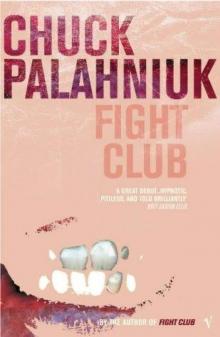 Fight Club
Fight Club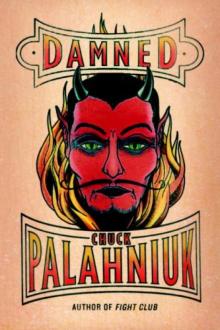 Damned
Damned Tell-All
Tell-All Choke
Choke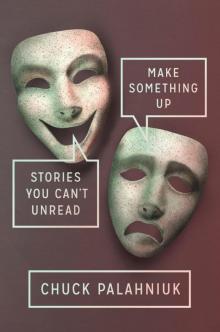 Make Something Up: Stories You Can't Unread
Make Something Up: Stories You Can't Unread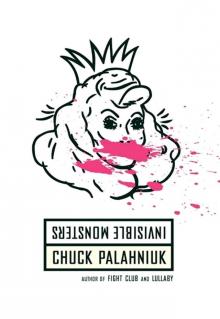 Invisible Monsters
Invisible Monsters Phoenix
Phoenix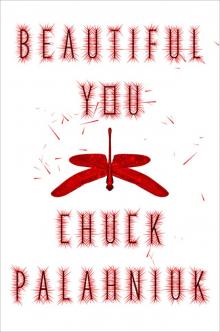 Beautiful You: A Novel
Beautiful You: A Novel Haunted
Haunted Survivor
Survivor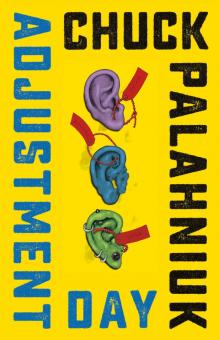 Adjustment Day
Adjustment Day Pygmy
Pygmy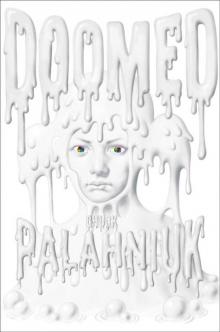 Doomed
Doomed Lullaby
Lullaby Snuff
Snuff Burnt Tongues
Burnt Tongues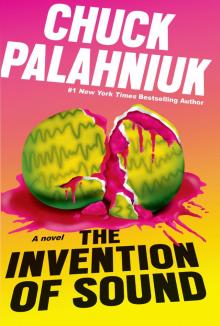 The Invention of Sound
The Invention of Sound Stranger Than Fiction (True Stories)
Stranger Than Fiction (True Stories) Rant: The Oral History of Buster Casey
Rant: The Oral History of Buster Casey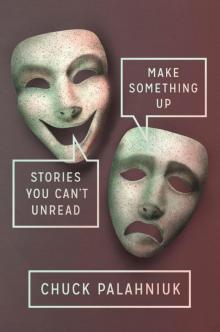 Make Something Up
Make Something Up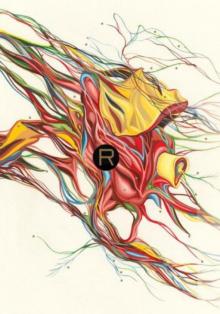 Rant: An Oral Biography of Buster Casey
Rant: An Oral Biography of Buster Casey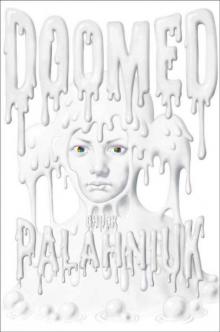 Doomed d-2
Doomed d-2 HOPE AND GORY
HOPE AND GORY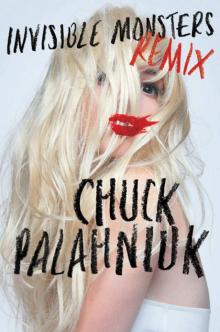 Invisible Monsters Remix
Invisible Monsters Remix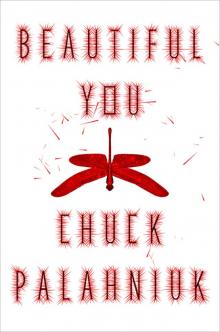 Beautiful You
Beautiful You Fugatives & Refugees
Fugatives & Refugees